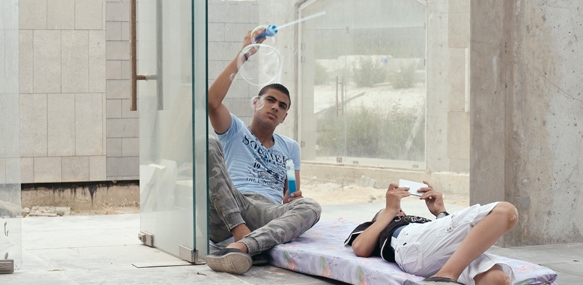Akram Zaatari - Tomorrow Everything Will Be Alright
Associação Cultural Videobrasil will hold the first-ever solo show in Brazil of the Lebanese artist Akram Zaatari, spanning the whole 800 sqm of Galpão VB. The co-founder of the Arab Image Foundation – devoted to preserving the cultural heritage of the Middle East and North Africa – and one of Middle East’s premier artists active today, Zaatari has a deep connection with the Associação, as he has been selected for eight different editions of the Contemporary Art Festival Sesc_Videobrasil.
Communication, politics, and relationships are some of Zaatari’s topics of choice, and he explores them in films, video installations, photographs, and text. His are works that deal with shifts and events in the history of his country, and they convey a portrait of contemporary Lebanon.
For the exhibition, curator Solange Farkas and co-curator Gabriel Bogossian picked six video installations produced from 1998 through 2014, whose backbone is the experience of emotions nowadays. The artworks explore questions of self-representation, identity, the body, desire, and the role of communication in interpersonal relationships, especially same-sex relationships in the Arab world. The city of Beirut, featured in some of the works in occasionally near-post-apocalyptic landscapes, also reveals the artist’s interest in evidencing the political and social context of Lebanon.
Three of the pieces will be having their Brazilian premiere. Dance to the end of Love (2011) incorporates material aired on Youtube and produced by individuals in Egypt, the UAE, Saudi Arabia, Palestine, Yemen, and Libya. Four different video channels are divided into themes including magic, bodybuilding, car stunts, dancing, and music. Another Resolution (2008/2013), an installation featuring 12 micro projectors, shows adults mimicking the poses of children in old family pictures. The images provide a glimpse of the changes undergone by Lebanon over the last few decades. Beirut Exploded Views (2014) is set in the aftermath of an apocalypse, as two young men make city ruins into their makeshift dwelling. The scenario is strikingly similar to the reality of refugees in Lebanon, and the settings in downtown Beirut resemble a city destroyed.
The three other featured pieces are part of the Videobrasil Collection and have been shown before in São Paulo, in different editions of the Contemporary Art Festival Sesc_Videobrasil, and in special showings.
An intense exchange of messages and suggestive notes also sets the tone in Tomorrow everything will be alright (2010), the Grand Prize winner at the 17th Contemporary Art Festival Sesc_Videobrasil and artwork that entitle this exhibition at Galpão VB. Red Chewing Gum (2000) is Zaatari’s reflection on the end of a relationship between two men. The story of the break-up is told through letters and set in the morphing urban landscape of Hamra, a Lebanese neighborhood that was once a bustling shopping district. Through the constant use of communication technologies, the piece shifts its focus back and forth between a dream, an audiovisual script, and hoped-for love. The End of Time (2012) is a poetical portrayal of a love affair that falls apart in the form of a choreography for two lovers who stage the beginning and the end of male desire, and the ephemerality of passion.
The Akram Zaatari exhibit will feature public programs activities including meetings where Brazilian artists, curators, and researchers will explore how Zaatari’s productions converse and intersect with those of Brazilian artists and researchers. A purposely created educational program, developed with the goal of familiarizing the public with the repertoire that the artist explores, will draw a parallel between key aspects of his output and the cultural experience of Brazil. As part of the exhibition project, critical essays on Akram Zaatari’s work will be compiled into the first reference book on the artist ever published in Brazil.
Akram Zaatari – Tomorrow Everything Will Be Alright is an exhibition produced by the Brazilian Ministry of Culture and by Associação Cultural Videobrasil under the Federal Culture Incentive Law, and sponsored by the Government Press Office. Held in partnership with Electrica Cinema e Vídeo and Galeria Kurimanzutto, it also relies on support from the Government of the State of São Paulo.
Akram Zaatari will be showing at Galpão VB until December 3, 2016.
About the Artist
Akram Zaatari (1966, Lebanon), one of the major contemporary artists of our time, works with image archives and documents to examine the notions of desire, resistance, memory, and surveillance, as well as image production and circulation in times of war and of shifting political boundaries. His projects convey a complex, consistent mosaic of recent Lebanese history. Zaatari has been featured in the Turin Triennial (2008), the biennials of Istanbul (2011), Venice (2007) and São Paulo (2006), and in DOCUMENTA (13) (2012). His works are in the collections of Tate Modern, Centre Pompidou, Kadist, MoMA, and MCA Chicago. He lives and works out of Beirut, Lebanon.
About Galpão VB
A venue for exhibitions, reflection, meetings, and research, Galpão VB was designed to activate the video collection Associação Cultural Videobrasil has amassed in three decades in activity. Focusing on productions from the global South, the Videobrasil Collection comprises artworks featured in the Contemporary Art Festival Sesc_Videobrasil, pieces donated by artists, seminal international video art works, recorded performances, testimonials, documentaries, publications, and documents amounting to nearly 10,000 items – 4,500 of which have been cataloged and are available for public consultation.
Galpão VB is the first facility ever to feature visual arts programming in Vila Leopoldina, in west side São Paulo. Open to the public since October 2015, it includes a gallery, a video room, a reading room, and an open-air garden. Its onsite shop offers the entire collection of books, magazines, and documentaries produced by the Videobrasil/Edições Sesc São Paulo partnership.
EXHIBITION FACT SHEET
Akram Zaatari’s exhibition “Tomorrow Everything Will Be Alright”
Galpão VB | Associação Cultural Videobrasil
Opening: September 3 (Saturday), 2016, 4pm to 8pm
Opening dates: September 5-10 (exceptionally from 11am to 8pm); September 13 to December 3, 2016 (Tuesday to Friday, 12pm to 6pm, Saturday, 11am to 5pm)
